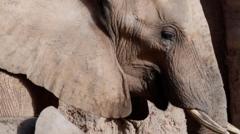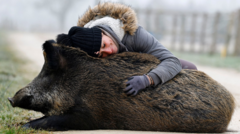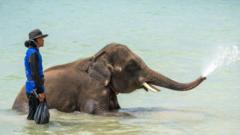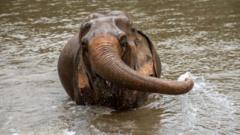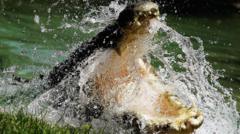Authorities investigate a troubling incident at the Hong Kong Zoological and Botanical Gardens where a twelfth monkey has died, raising alarms about a potential soil contamination that could also pose risks to humans.
Twelfth Monkey Succumbs to Bacterial Infection at Hong Kong Zoo
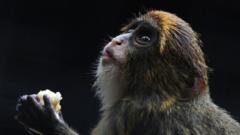
Twelfth Monkey Succumbs to Bacterial Infection at Hong Kong Zoo
A catastrophic bacterial outbreak claims another life among capuchin monkeys.
In a tragic turn of events, the twelfth De Brazza's monkey at the Hong Kong Zoological and Botanical Gardens has died amid an alarming outbreak of bacterial infections that have already taken the lives of 11 conspecifics over the past ten days. This latest death occurred shortly after the initial reports, prompting urgent tests to verify if the same bacterial strain was responsible.
All deceased monkeys had been kept in isolation since October 13, following the first series of fatalities. Autopsy results revealed a significant presence of sepsis-inducing bacteria, which experts suspect originated from contaminated soil near the primate enclosures. Hong Kong's Culture, Sports and Tourism Secretary disclosed to local media that construction workers potentially brought in the contaminated soil via their footwear while digging.
Prominent veterinary epidemiologist Dirk Pfeiffer, from City University of Hong Kong, indicated that the likelihood of the infection spreading to humans is "fairly low," although he emphasized a concerning trend regarding underreported soil contamination in Asian regions. "Multiple sudden mortalities in usually stable animal populations is always alarming," he noted.
The initial eleven monkeys included critically endangered species, such as cotton-top tamarins, along with white-faced sakis and common squirrel monkeys. The official cause of death for these animals has been identified as melioidosis, an infectious disease linked to exposure to contaminated soil, air, or water, caused by the Burkholderia pseudomallei bacteria, which is endemic to tropical and sub-tropical areas.
The recent fatalities have left authorities on high alert, resulting in the temporary closure of the mammal section since October 14 for disinfection and cleaning procedures. Officials have reassured the public that the health status of the remaining 78 mammals in the zoo is "normal."
As part of the fallout, the animal rights organization PETA has raised concerns regarding the risks of zoonotic diseases, including monkeypox. PETA campaign manager Abigail Forsyth urged for a reevaluation of keeping animals in captivity for entertainment, highlighting the necessity of protecting their natural habitats to ensure both animal welfare and public health.
This incident reflects a troubling historical context as the first recorded cases of melioidosis in Hong Kong date back to the mid-1970s, when a catastrophic event led to the deaths of 24 dolphins at Ocean Park.


